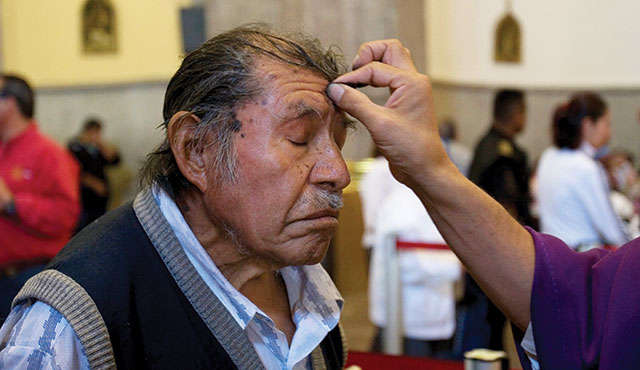After an unusually rainy winter, we’re ready for spring. But first, we must experience the 40 days of Lent.
Interestingly, the word Lent derives from the Middle English word Lenten, meaning springtime, or the time the days lengthen.
Lent is 40 days in recognition of the gospel story about Jesus fasting in the desert for 40 days, as he’s tempted by Satan. Traditionally, Lent begins on Ash Wednesday and ends at sundown on Holy Thursday; Sundays are not counted.
In recognition of the early Christian traditions, Catholics are asked to fast and abstain from meat on certain days.
To fast means to limit food to one full meal a day with the possibility of two smaller meals that don’t add up to a full meal. Abstinence means not eating meat, but fish is allowed. Those 14 years and older, up to age 59, are to abstain from meat on Ash Wednesday, all the Fridays of Lent, and Good Friday.
While the Church doesn’t specifically require that we do more than fasting and abstinence, the spirit of Lent suggests that we follow the history of the early Christians who found prayer, fasting, and almsgiving to be an important part of repentance and renewal. Lent helps us grow closer to Jesus Christ when we do something extra such as pray, give money or goods to the needy, or do extra acts of charity.
Bishop David L. Ricken of Green Bay, Wisconsin, wrote a list of the “10 Things to Remember for Lent,” which can be found on the website of the United States Conference of Catholic Bishops, usccb.org.
One of Bishop Ricken’s things to remember is that we shouldn’t do too much. “It’s tempting to make Lent some ambitious period of personal reinvention,” he writes, “but it’s best to keep it simple and focused. There’s a reason the Church works on these mysteries year after year. We spend our entire lives growing closer to God. Don’t try to cram it all in one Lent.”
Some of the other things he includes on his list are to:
- Remember the formula. The Church does a good job capturing certain truths with easy-to-remember lists and formulas: 10 Commandments, seven sacraments, three persons in the Trinity. For Lent, the Church gives us almost a slogan—prayer, fasting and almsgiving—as the three things we need to work on during the season.
- Recall that Lent is a time of prayer. Lent is essentially an act of prayer spread out over 40 days. As we pray, we go on a journey, one that hopefully brings us closer to Christ and leaves us changed by the encounter with him.
- Know that Lent is a time to fast. With the fasts of Ash Wednesday and Good Friday, meatless Fridays, and our personal disciplines interspersed, Lent is the only time many of today’s Catholics actually fast. And maybe that’s why it gets all the attention. Fasting is actually a form of penance, which helps us turn away from sin and toward Christ.
Bishop Ricken also says that during Lent we must be patient with ourselves. “When we’re confronted with our own weakness during Lent, the temptation is to get angry and frustrated,” he writes. “But that’s the wrong lesson. God is calling us to be patient and to see ourselves as he does, with unconditional love.”

